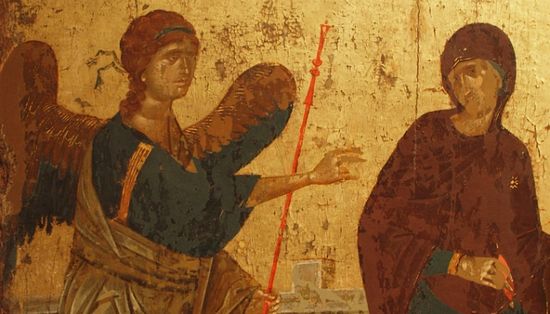Annunciation and Choosing Life
 Recent statistics indicate that about half of all pregnancies in America are “unintended,” and of those, four out of ten end in abortion. Perhaps most disturbingly, over 70% of women involved in an abortion report some sort of religious affiliation.
Recent statistics indicate that about half of all pregnancies in America are “unintended,” and of those, four out of ten end in abortion. Perhaps most disturbingly, over 70% of women involved in an abortion report some sort of religious affiliation.
In the Orthodox Church, we commemorate the Great Feast of Annunciation on March 25. Without coincidence, this occurs nine months before the Great Feast of Nativity or Christmas. In the Annunciation, we celebrate not only the Incarnation, but the actualconception of Jesus Christ. As the Creed states, “who was conceived by the Holy Spirit and the Virgin Mary and became man.” We also remember the conception of Mary herself later in the year. And again, not merely their birth or the bare facts of their existence, but theirconception—what the Church has forever, and ever shall recognize as the beginning of life. This is without question, and has been universally attested since the apostles.
Among various segments of Protestantism and other religious or non-religious affiliations, this is an unsettled question or hotly-contested debate. For many, the autonomy of the individual and their own personal choice is held over and against the life in a mother’s womb.
Perhaps the loss of Annunciation as a feast of central importance in the life of the Church is to blame? I don’t think it’s crazy to suggest as much. By focusing on the moment of conception as the beginning of the mystery of the Incarnation, the Orthodox Church preserves an essential truth—that life begins at conception. Beyond this, we learn the true value of an individual’s free will or freedom of choice—a godly and pure stance of “pro-choice,” if you will—when our own wills persist in a harmonious synergy with the divine will of God.
By saying “yes” to God, Mary was not only freely choosing her own destiny, but also the destiny of mankind ever since. Because of this choice, we rightly honor her as the true Eve (“Eve” in the Greek Old Testament is “Zoe” or “life”; cf. Gen. 3:20), the new and true Mother of Life (as we often hymn) who freely chose life over death; salvation over bondage. She is truly blessed.
Contrary to feminists and pro-choice advocates of today, Mary’s choice for life was one of freedom and redemption, not slavery and constraint. The first Eve was the woman choosing death over life, preferring her own will and discernment to that of God. The first Eve was “pro-choice” in the modern sense of the phrase.
As St. Irenaeus explains in the second century:
For just as [Eve] was led astray by the word of an angel, so that she fled from God when she had transgressed His word; so did [Mary], by an angelic communication, receive the glad tidings that she should bear God, being obedient to His word. And if the former did disobey God, yet the latter was persuaded to be obedient to God, in order that the Virgin Mary might become the patroness of the virgin Eve. And thus, as the human race fell into bondage to death by means of a virgin, so is it rescued by a virgin; virginal disobedience having been balanced in the opposite scale by virginal obedience.
—Against Heresies 5.19.1
By holding dear the Annunciation as a central feast of the Church, the earliest Christians were not confused when it comes to either their own autonomy as individuals or the onset of human life. As early as St. Gregory the Wonder-worker (ca. A.D. 262), the Annunciation was commemorated with festivals, hymns, and sacred reflections. As he stated in one of his own homilies on the occasion of the feast:
It is our duty to present to God, like sacrifices, all the festivals and hymnal celebrations; and first of all, the feast of the Annunciation to the Holy Mother of God, to wit, the salutation made to her by the angel, “Hail, full of grace!”
—Four Homilies 2
Further, one of the earliest Christian hymns outside the biblical Psalms (ca. A.D. 250) is written in honor of this same Mother of Life:
Beneath thy tenderness of heart we take refuge, O Theotokos;
Disdain not our supplications in our necessity,
But deliver us from perils,
O only pure and blessed one.
In honoring Mary, we are honoring the very beginning of true Life. Through Christ’s conception, birth, life, death, resurrection, ascension, and glorious and second coming, we are granted the fullness of this true Life in God. Through our commemorations and hymns, we are reminded continually just how precious life really is. Through this solemn remembrance, we are brought anew into the presence of God, who is Life himself.
The persistence of both abortion and infanticide in a world so advanced in other human ways is shocking. And without question, a loss of these “old-fashioned” ideas and religious faith has led to our contemporary barbarism. Our Enlightenment and various revolutions have indeed been a spiritual darkening and rejection of all we once held dear. They have resulted in a rejection of God himself, in every way, shape, or form imaginable—both public and private, civic and religious.
The world is shocked at the crashing of planes and the senseless deaths of those we hold dear, but when those who cannot cry out are slaughtered by the thousands on an annual basis, we hardly bat an eye.
Only by recalling the truth of the Annunciation can we rediscover what we have altogether lost—a decision to embrace true life in Christ.
Gabe Martini
Source: Pravoslavie.ru

